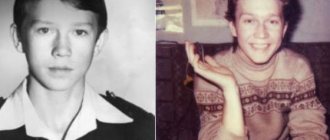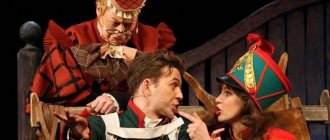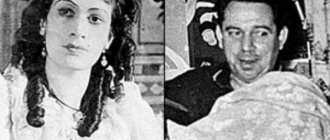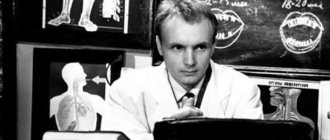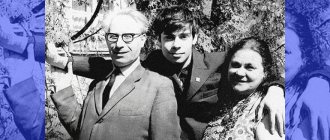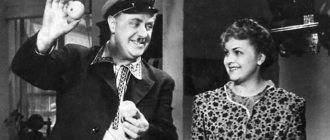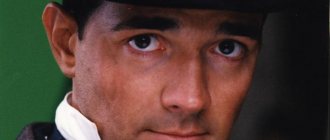“I fell ill with acting”: childhood years
Evgeny Mironov in his youth. Photo from the personal archive of Evgeny Mironov / old.emironov.ru
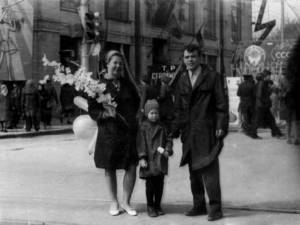
Evgeny Mironov with his parents. Photo from the personal archive of Evgeny Mironov / old.emironov.ru
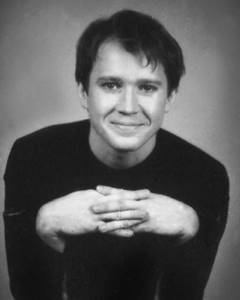
Evgeny Mironov in his youth. Photo from the personal archive of Evgeny Mironov / old.emironov.ru
Evgeny Mironov was born on November 29, 1966 in Saratov and lived with his parents in the village of Tatishchevo-5 (now Svetly) in the Saratov region. His father Vitaly Mironov worked as a driver, and his mother Tamara Mironova worked as a collector of Christmas tree decorations at a factory. The Mironov family also had a daughter, Oksana, who became a ballerina and opened a children's dance studio.
As a child, Evgeny Mironov studied in a drama club and music school, and danced in an ensemble. His parents were fond of cinema and theater - the whole family took part in local amateur art competitions and staged home performances. The actor said: “From the very beginning I had no other thought about the profession. Apparently, the stories of my parents, who participated in amateur performances, influenced me so much that I became interested in acting. It never occurred to me that I could become someone else.”
In 1982, Mironov graduated from eight classes of school and entered the Saratov Theater School named after Ivan Slonov on the course of Valentina Ermakova. His first academic work was the role of Ivan from the story “Ivan” by Vladimir Bogomolov. In 1986, the aspiring actor successfully graduated from college and went to enroll in Moscow. He hoped for help from the then-famous director and theater teacher Oleg Tabakov, who was also from Saratov and often helped his fellow countrymen.
“I came to Moscow in full confidence that if I said the code word “Saratov”, everything would happen. And I stood near the Moscow Art Theater at the service entrance: he was playing “The Bench” with Doronina. He appeared quickly, flew past me, but I still managed to say the code word “Saratov”. He stopped, looked at me and said: so what? I muttered some pitiful words like here, they say, a nugget, take this, and all that. He dictated his home phone number and disappeared."
Evgeny Mironov, Teatral magazine
Oleg Tabakov assigned Mironov a two-week probationary period, during which time the actor had to prepare an excerpt for screening. The actor, in an interview with Viktor Borzenko and Teatral magazine, recalled: “During the exam, I did one exercise, jumped to the ceiling, and he noticed this and said: apparently, you are a capable boy. And they took me on the course. But then the Saratov password did not work. I was like a gray mouse. I was terribly afraid of Moscow, and it seems to me that he looked at me with the feeling of a natural scientist: will he survive or not.” The students in Tabakov’s workshop were already in their second year at the Moscow Art Theater School, so Mironov skipped ahead. A year later, in 1987, he played Eugene Jerome in Tabakov’s play “Biloxi Blues” based on the play by American playwright and screenwriter Neil Simon.
“Tabakerka”, “Sovremennik”, Moscow Art Theater and foreign directors: theater
Evgeny Mironov as Grishka Otrepyev in Declan Donnellan's play "Boris Godunov". 2009. Photo: Cheng Li / old.emironov.ru
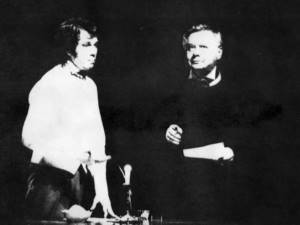
Evgeny Mironov (left) as Alexander Aduev and Oleg Tabakov as Pyotr Aduev in Oleg Tabakov’s play “An Ordinary Story.” Moscow Theater of Oleg Tabakov, Moscow. Photo from the personal archive of Evgeny Mironov / old.emironov.ru
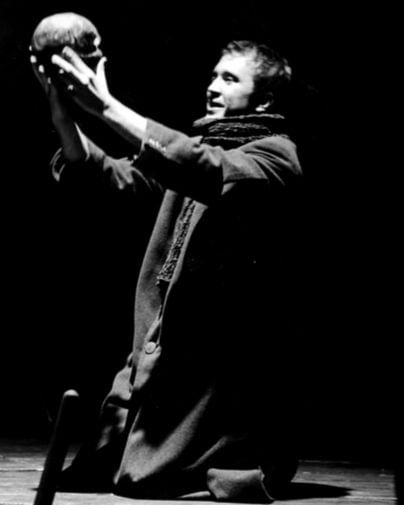
Evgeny Mironov as Hamlet in Peter Stein's play Hamlet. Photo from the personal archive of Evgeny Mironov / old.emironov.ru
In 1990, Evgeny Mironov graduated from the Moscow Art Theater School and received invitations from three theaters at once. Oleg Efremov invited him to the Moscow Art Theater, Vladimir Portnov - to the Theater on Malaya Bronnaya, but Mironov, together with fellow student Vladimir Mashkov, accepted Oleg Tabakov’s offer and joined the Moscow Theater Studio under his leadership. In “Snuffbox” he participated in the plays “Pushed”, “The Inspector General”, “Ordinary History”. In 1991, Mironov triumphantly played David Schwartz in Tabakov’s already legendary play “Sailor’s Silence” based on the play by Alexander Galich. The second main role, Abram Schwartz, was played by Vladimir Mashkov. Then the actor played leading roles in the productions of “The Passion of Bumbarash” and “Finest Hour in Local Time” by Vladimir Mashkov, “Anecdotes” and “More Van Gogh...” by Valery Fokin.
In 1994, the famous German director Peter Stein invited Mironov to play the role of Orestes in the play “Oresteia” based on the tragedies of Aeschylus “Agamemnon”, “Choephora” and “Eumenides”. The production lasted seven hours and was not to everyone’s taste in Russia, but was popular in Europe. In addition, this work inspired Stein to stage Shakespeare's Hamlet in 1998 with Mironov in the title role. The director transferred the action to the boxing ring, and depicted Hamlet's inner experiences as a fight with himself. The performance was highly praised by critics and the public, it toured cities in Russia and abroad, and Mironov received the status of a leading theater actor of the new generation. He got used to the role so much that one day, after performing twenty-five “Hamlets” in a row, he went to a boarding house to be treated for depression.
Then Mironov played in two performances by Fokine at Sovremennik. In 1995 - Ivan Karamazov in the production of “The Karamazovs and AD” based on the late works of Fyodor Dostoevsky. And in 1996, the actor played the role of the former chairman of the Ural Cheka Fyodor Lukoyanov in the play “The Last Night of the Last Tsar” and received the International Stanislavsky Prize for the best actor of the season. In addition, since 2000, Mironov began collaborating with the Moscow Art Theater. Chekhov, whose artistic director was Tabakov. For his roles as George Pigden in No. 13 and Porfiry Golovlev in The Golovlev Gentlemen, he received the Crystal Turandot Award. The actor also played the role of Konstantin Treplev in “The Seagull.”
In 2000, the actor played Grishka Otrepyev in the production of “Boris Godunov” by English director Declan Donnellan. It was a modern interpretation of the classic tragedy of Alexander Pushkin: the actions were reminiscent of a 21st century political race with debates and talk shows. For his work in the play, Evgeny Mironov was awarded the “Seagull” theater prize. The production was shown not only in Moscow and St. Petersburg, but also in many foreign countries. In 2003, Mironov worked with another world-class director, Eimuntas Nyakrosius. In his production of The Cherry Orchard, the actor played Ermolai Lopakhin, whose image was key in the interpretation of the Lithuanian director. It was after the premiere of this performance that many critics began to call Yevgeny Mironov the number one actor on the domestic stage. And in 2004 he received the title of People's Artist of the Russian Federation.
In 2006, the actor created the Evgeny Mironov Theater Company and produced the play Figaro. Events of One Day" directed by Kirill Serebrennikov, and also played the main role in it. The classic comedy by Pierre Beaumarchais was set in an office space, and Figaro was dressed in a modern suit.
The St. Petersburg Drama Theater “On Liteiny” is on tour in Syktyvkar. In total, more than 30 actors arrived from the northern capital to participate in three performances. Among them is Syktyvkar resident Sergei Mironov, who two years ago participated in productions of the Viktor Savin Drama Theater. The 28-year-old actor played as part of the St. Petersburg theater troupe in the drama based on Maxim Gorky’s play “Family Portrait” and the musical “A Christmas Tale with Ghosts,” based on “A Christmas Tale” by Charles Dickens, after which he answered questions from a BNK correspondent.
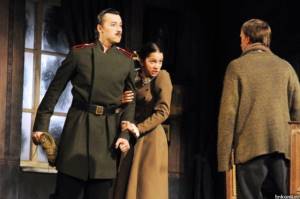
Photo by Andrey Retanov
– Sergey, you have already worked in St. Petersburg at the Akimov Comedy Theater. Since last year you have been working at the Liteiny Theater...
– Yes, they are already making fun of me, saying that I am specifically going to work in that St. Petersburg theater that is planning a tour in Syktyvkar. In fact, if you want to ask why this happened, then it’s easier to say - fate turned out that way. And I am sincerely glad that today I work in this theater. The theater collaborated with amazing writers, theater, painting, and music figures. Sologub, Shchepkina-Kupernik, Teffi, Averchenko, Meyerhold, Kustodiev, Shostakovich. Personally, I find it very flattering to work within walls that remember these names. Besides, I feel very comfortable here. Interesting roles, good team. The troupe includes actors of very high skill, I like to learn from them.
- Since we're talking about masters. In the play “Family Portrait” you perform on the same stage with many honored artists: Alexander Ryazantsev, Sergei Zamorev, Sergei Gamov, Elena Lozhkina. Tatyana Tkach is a People's Artist of Russia. What is it like for you, literally just yesterday a graduate of the theater studio, to work side by side with them?
- Insanely interesting. And what I like is that our “mastodons” behave very correctly towards young people. Here is Alexander Ryazantsev - he plays brilliantly, but he will never make a comment. If you ask, he will give advice, suggest, explain, but will never impose his opinion. A very delicate, intelligent actor.
– In our native walls, “Family Portrait” is performed on a chamber stage. Was the transfer to a larger site in Syktyvkar a success?
– There was no discomfort. In general, we have performed this performance on the big stage four times already in different geographical locations. Of course, having acquired a new volume, the production began to live a different life. But I never “choked.” And that says a lot. Transferring from a small stage to a large one is a very controversial issue. On the chamber stage the energy is different, all emotions seem to gather at one point and do not spill out. On the big stage, artists even talk differently. Although “Family Portrait” is a successful work in every sense, and it’s great that it can be shown not only in St. Petersburg. For me, this is generally the most powerful performance in the theater’s repertoire today.
– But this is still Gorky. It’s difficult to stage and play, and not very easy to watch.
– After the performance in Yaroslavl, where the audience received us very well, the director said: “So then you say that classical Russian theater is dying!” It seems to me that all the numerous attempts today to adapt to the West, to be so fashionable and creative, ultimately come down to the fact that we are moving away from our own history, from our roots, mentality. Some superstructures appear that are alien to us, while something real, very understandable and close to any Russian person, is lost. And “Family Portrait” is a demonstrative performance. Because Gorky's characters, created a hundred years ago, say things that are very relevant today. Take my hero Yakorev, he’s a vile guy. But when you watch him, in his actions, actions, thoughts you can easily recognize different representatives of today's police, and not only the police.
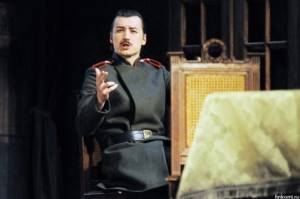
– You have many different roles under your belt. From the Prince in “Cinderella” to the police officer Yakorev in “Family Portrait”. What is more interesting for you to play?
- People like Yakorev. He’s a bastard, of course, an opportunist, but so real. Princes are boring. Too correct. Playing a positive hero is difficult; you rarely see them in real life. There is no one to “peep” the invoice. But people like the district police are a dime a dozen. There is room for character building.
– Several years ago, “Kalevala” and “Last Summer in Chulimsk” were staged on the stage of the Victor Savin Drama Theater. These were the graduation performances of your studio, which brought together students from Komi. How do you evaluate your work in these productions today?
– Essentially, these were the first steps on the professional stage. These are the roles that I did as if from a stencil. In textbooks they always write a rule, and after it an example, so that it becomes clearer what we are talking about. So for me, these performances are just such an example. Over time, experience and understanding of the rules appear. But these very first tests of themselves, they become very close. Moreover, my roles in these performances were interesting. Unfortunately, the fate of these performances is as dramatic as Vampilov’s plot.
– It’s probably too early to ask you, but I’ll still risk it: are you disappointed in your profession?
- There is no disappointment. Although the difference between what we imagine about the work of an actor when we embark on this path and what actually is is huge. And I perfectly understand those who sincerely prohibit children from becoming artists. It’s not easy, no one will offer you a bath in champagne. Here you need to plow, sweat, be nervous, gnaw at your elbows, run a lot, observe, work with your head and more, argue, sometimes break yourself, so that you can eventually put on a suit that is already soaked in the sweat of another actor. And at the same time understand that this is your dream. Because an artist's biggest drama happens when he doesn't have a job. This is a very cruel profession.
– Theater studio master Andrei Andreev, who taught you your course, said in one interview that there is no such thing as a provincial theater. In his opinion, there is either a professional theater or a drama club. Do you agree with him?
“I wouldn’t evaluate my surroundings so radically.” Because Ranevskaya also said that real theater began to die when she was little. What is left for us then? It seems to me that any creativity is justified if there is a demand for it. If a viewer comes to the theater, it means that this art is in demand. And if the viewer comes again, that means there is quality. It is very difficult today to give any assessments based on professional criteria. Well, like a theater, where performances are staged, where actors, directors, and technical staff serving the stage work, it can be a drama club...
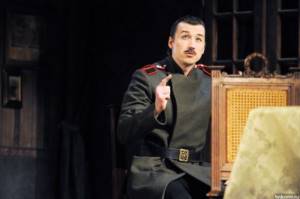
– During the tour of the Syktyvkar Drama Theater in St. Petersburg, did you manage to watch anything?
– I saw the second act of Hamlet.
– What are your impressions?
“It was very gratifying to see my fellow countrymen and especially my classmates on the stage of the Liteiny Theater.” Moreover, the performance, in my opinion, was received with great success. Of course, someone will say that most of the audience there were people from Komi. So what? They are exactly the same spectators. And if they watched to the end and applauded, some even standing, it means that something caught their attention. In Syktyvkar, I remember, there was a scandal around one of the scenes in the play. In St. Petersburg they have not paid such attention to such things for a long time, they are used to it. Something else seemed more interesting to me - many of our actors said that there was little dynamics in the Syktyvkar production. But it's very easy to explain. It is enough to go outside in Syktyvkar after living in St. Petersburg. We live in different rhythms. After St. Petersburg, it seems to me that everything here is worthwhile. But the theater still reflects life, where will the St. Petersburg dynamics appear in the Syktyvkar performance?
– When you lived in Syktyvkar, I remember you often appeared at various musical events. He played, sang, even played music on the saw. How are things with music now?
“It’s okay, she’s with me.” I give concerts regularly, and am now preparing for a tour in Norway. In addition, he wrote music for two fairy tales: the play “Mistress Blizzard” by the Wandering Theater and the production of “Toys” by the Rostov Youth Theater. In the first one there was a lot of work with ethnic music, such an immersion in Nordic melodies. In the second one I experimented more with sound production. Recently, the premiere of the play “The Flea” based on Zamyatin’s play took place at the Liteiny Theater. I played the Tula gunsmith Lefty in this production. But, in addition, he acted as a musical director and author of arrangements. It was difficult, but it turned out well, in my opinion. I don’t have a professional musical education, so I wrote all the music for the play as an actor, passing everything through the characters. And, by the way, about the saw. My Lefty plays exactly on it.
– Previously, you had a family living in Syktyvkar, but now your parents have moved to another city. It turns out that besides friends and memories, nothing else connects you with our city?
- It turns out so. But if they call me and say: “Seryoga, come play in a play or just come for a couple of days,” I will most likely come.
Movie
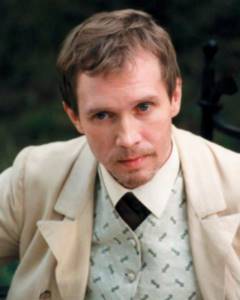
Evgeny Mironov as Prince Myshkin in Vladimir Bortko’s serial film “The Idiot” (2003)
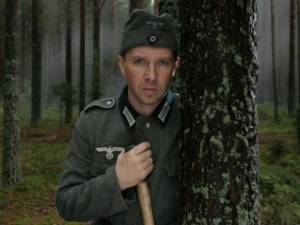
Evgeny Mironov in the multi-part feature film by Gennady Sidorov, Nikolai Lebedev and Yuri Moroz “Apostle” (2008)
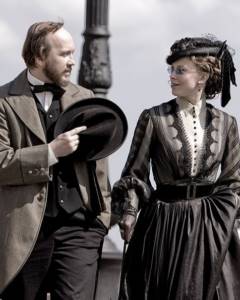
Evgeny Mironov as Fyodor Dostoevsky and Olga Smirnova as Apollinaria Suslova in the serial film by Vladimir Khotinenko “Dostoevsky” (2010)
Yevgeny Mironov began acting in films while still a student. In 1988, he starred in the film “The Kerosene Man’s Wife” by Alexander Kaidanovsky, then in several more films. And in 1991, Mironov played the main role of Sasha in Valery Todorovsky’s film “Love” and became famous as a film actor. In 1992, for this work he received many film awards, including the Grand Prix at the Geneva International Film Festival. In the same year, Mironov played a cheerful lieutenant who fell in love with the young wife of the unit commander in the tragicomedy “Anchor, More Anchor!” Peter Todorovsky. At the end of the year, Mironov received the title of best actor in the country. Then he starred in the films “Limita” and “Mama” by Evgeny Evstigneev, “Burnt by the Sun” by Nikita Mikhalkov, “Muslim” by Vladimir Khotinenko.
In 2003, one of Yevgeny Mironov’s most notable film works was released: he played the role of Prince Myshkin in the film adaptation of Fyodor Dostoevsky’s novel “The Idiot” directed by Vladimir Bortko. His partners were Vladimir Mashkov, Lidiya Velezheva, Inna Churikova, Oleg Basilashvili, Mikhail Boyarsky. The film was a great success, and Mironov was awarded “TEFI” and “Golden Eagle”.
In 2008, Mironov starred in the 12-episode television film “Apostle.” He played a rural teacher who, at the beginning of the war, turned out to be the twin brother of a deceased German saboteur and became part of a security operation. His partners were Nikolai Fomenko and Daria Moroz. For the role of brothers Pavel and Pyotr Istomin, Mironov was awarded TEFI.
In 2011, the actor played Fyodor Dostoevsky in the television series of the same name. He seriously prepared for the role: he went to museums, studied memoirs, re-read the writer’s works, and recalled how he played his characters - Ivan Karamazov and Prince Myshkin. Mironov said that it was even more difficult for him to play Dostoevsky himself, since he consists entirely of his heroes. In addition, in order to portray a person who suffers from epilepsy and whose facial expressions change literally every second, the actor talked with doctors and watched videos of patients. He also found a particularly high and at the same time dull timbre of Dostoevsky’s voice - a tenor “with a crack”, thanks to which the writer “took over the halls”. For this role, Mironov was awarded the Golden Eagle.
“To play and think every second that you are playing the role of a genius is unbearable. As soon as I forgot about responsibility, I immediately plunged into the problems of a person who loves and suffers - and it became easier for me. Dostoevsky later wrote that if it had not been for his imprisonment in the city of Omsk, he would not have become what he became. These people whom he saw there, with whom he spent four years side by side, made him different. After the unimaginable literary fame that he gained in narrow circles after writing “Poor People,” being in prison suddenly knocked all arrogance from him. Made him go deeper into himself. And the film shows spiritual changes"
Evgeny Mironov, interview with Rossiyskaya Gazeta
Mironov starred in the films “Burnt by the Sun - 2”, “Space as a Premonition” and received the Nika Award for both works. He also played in the films “On Verkhnyaya Maslovka”, “Piranha Hunt”, “The Calculator”, “Escape”, “By Stage”.
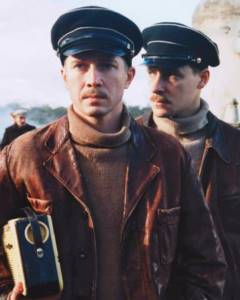
Evgeny Mironov (left) as Viktor Konkov and Evgeny Tsyganov as Herman in the feature film “Space as a Premonition” by Alexei Uchitel (2005)
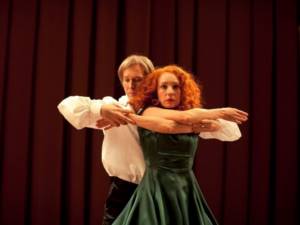
Evgeny Mironov as Petya and Chulpan Khamatova as Lisa in Elena Khazanova’s feature film “Petrushka Syndrome” (2015)
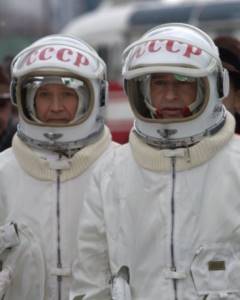
Evgeny Mironov (left) as Alexey Leonov and Konstantin Khabensky as Pavel Belyaev in Dmitry Kiselev’s feature film “The Time of the First” (2017)
In 2013, Hollywood director Vadim Perelman shot a serial detective historical saga with elements of melodrama “Ashes”, which takes place in 1938–1948. The film is based on the real story of the famous thief Arseny Pepel, played by Mironov. His hero accidentally exchanged documents, and therefore lives, with Red Army captain Igor Petrov. His role was played by Vladimir Mashkov. Elena Lyadova, Chulpan Khamatova, Sergei Garmash, Andrei Smolyakov also played in the series. It became the highest-rated television project of the year on the Russia-1 channel.
In 2014, the actor, in a duet with Chulpan Khamatova, played the main role in Elena Khazanova’s film “Parsley Syndrome” based on the novel of the same name by Dina Rubina.
In 2021, the film “Time of the First” by Dmitry Kiselev about cosmonauts Alexei Leonov and Pavel Belyaev, who for the first time in human history went into outer space during their flight on the Voskhod-2 spacecraft in 1965, was released. Mironov played Leonov, who was still alive at that time. The actor talked a lot with the cosmonaut, he recalled: “In life, Alexey Arkhipovich turned out to be completely different from what I imagined him to be. He is a very cheerful person, always has a positive attitude towards what is happening, despite difficult and sometimes catastrophic situations.” The role of Belyaev was played by Konstantin Khabensky. Both actors completed training courses and watched as the cosmonauts were launched into flight from Baikonur. Mironov said: “We were driven in the same centrifuge, which had been preserved almost from the time of training by Leonov and his colleagues. But physical endurance was not the main problem. The psychological problem turned out to be much more acute: a closed space in which we also had to play dramatic scenes. For the first time in my acting life, I felt some fear. And I’m not at all ashamed to talk about it.” For this role he received the Golden Eagle. In addition, Mironov, together with Timur Bekmambetov, produced the film.
Then the actor starred in the films “Matilda”, “Demon of the Revolution”, “Carp o”, “Goalkeeper of the Galaxy”, “Awakening” and “The Heart of Parma”.
Social activity
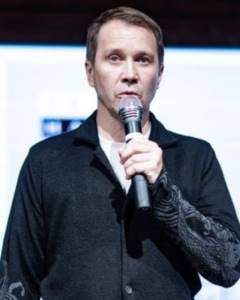
Evgeny Mironov at the presentation of the 2019–2020 theater season. Photo: thecity.m24.ru
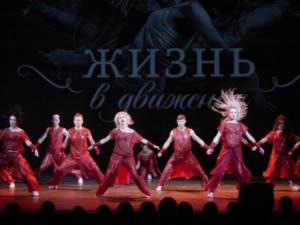
Evgeny Mironov Foundation “Life in Motion”. Photo: zdrav.fom.ru
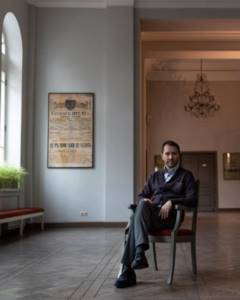
Evgeny Mironov. Photo: cultura24.ru
In 2003, Evgeny Mironov proposed creating the “Action to Support Theater Initiatives” award. It was awarded until 2011 with the support of the Administration of the President of the Russian Federation. In 2004, the actor also became a member of the Presidential Council of the Russian Federation for Culture and Art. At the same time, he became the chairman of the organizing committee of the International Festival - School of Contemporary Art TERRITORIA. Mironov admitted that he created this project because he realized that he himself lacked knowledge in this area. Students from theater universities in Russia, the CIS and the Baltics participate in the events of the festival-school. The art direction also included Roman Dolzhansky, Teodor Currentzis, Maria Mironova, Kirill Serebrennikov, Andrey Uraev and Chulpan Khamatova.
In 2008, the actor created a charitable foundation to support artists, “Artist”. It provides material and moral support to older generation theater and film actors in 63 cities of Russia. In 2014, Mironov also co-founded the Life in Motion charity foundation. It helps children with disabilities, orphans and children who are left without parental care and have pathologies of the musculoskeletal system.
Personal life of Evgeny Mironov
The personal life of Yevgeny Mironov is hidden under a veil of secrecy. Currently, the film actor appears alone at various events, which gives rise to various rumors. Mironov has no children and no beloved woman. According to him, he has felt a feeling of love since adolescence, which never turned into strong love. Numerous fans are wondering why there is only one such prominent man, Evgeniy Mironov, whether he is gay or not.
In Lera Kudryavtseva’s show program “Secret for a Million,” the film actor revealed almost all his secrets. He said that he was seriously in love with Maria Gorelik in his youth. The young man dreamed of becoming the girl’s husband, but this did not happen, as she soon fell in love with another guy whom she married. Currently, the former lover lives in Israel. When Evgeniy was on tour in Tel Aviv, Maria came to the performances. She talked to the man, saying that she was happily married. The woman is raising two children.

In the mid-90s of the last century, Mironov met with Anastasia Zavorotnyuk. But literally after a few months the meetings fizzled out. Soon after this, the artist appeared at social events with Alena Babenko. But, according to Eugene himself, the relationship was purely friendly. They are still friends to this day. The actor says that he can consult Alena on any matter. And the popular film actress herself can be confident in his friendly support.
At the beginning of the new millennium, it became known that Yevgeny Mironov had a beloved woman named Marianna. The artist himself recently admitted that he did not see his chosen one as his wife, so he did not propose to her to officially register the relationship. They stayed together for several years and then separated.
In 2008, articles appeared in the media claiming that the Russian film star was dating the wife of Governor Slutsker. The actor himself denied this, but the family soon broke up.
In 2015, various publishing houses began to disseminate information that Evgeny Mirovov is gay. The articles said that the actor was in an intimate relationship with his colleague Sergei Astakhov. According to rumors, the marriage took place in one of the German marriage agencies.
A serious scandal broke out, initiated by Sergei Astakhov. He accused the journalist of falsifying facts and spreading gossip. Yevgeny Mironov did not take part in the scandal. He said that if a person spreads rumors about his sexual orientation without knowing it in detail, then he is a sick person. After this, the actor refuses to answer such questions in an interview.
Personal life
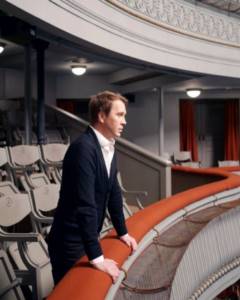
Evgeny Mironov. Photo: kino-teatr.ru
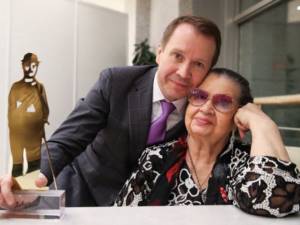
Evgeny Mironov - winner of the Charlie Chaplin Award for outstanding contribution to cinema - and his mother Tamara. Photo: Vyacheslav Prokofiev / TASS
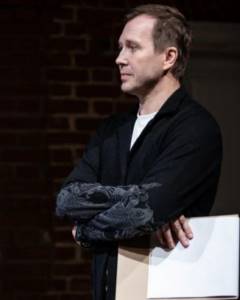
Evgeny Mironov. Photo: vm.ru
Evgeny Mironov was not married and carefully hides his personal life. His mother Tamara Mironova said in an interview with Express Newspaper: “I used to worry that my son wouldn’t get married, I pestered him: “If I’m gone, where will you go? In cold walls? Why can’t you find your soul mate?!” He answered: “Mom, those who found their soul mate have already divorced a long time ago. I have so little free time that I wouldn’t be able to make my family happy.” And yet he still couldn’t convince me until the end. But one day my son said what I understood: “I was sent by God to earth only to make art.”
In 2021, it became known that Mironov has a small son. The actor hid it from the public eye, but in September 2021 he took it with him to the premiere of the cartoon “Belka and Strelka. Caribbean Mystery. In it, as in the two previous parts, Mironov voiced a rat named Venya. He said: “It seems to me that we have never had such high-quality domestic cartoons, we can be proud of this. My son Petya is sitting in the hall. When I voiced my character, I took him on one of the shifts. I couldn't find some words that my hero shouts to one giant. We couldn't come up with them. But Petya came up with them. This phrase is simple, but it fits in very precisely, and it sounds like this: “The monster is a little thing!” So children are co-authors of our cartoon!”
Wife of Evgeny Mironov. Is he blue? Gay or not?
The unknown personal life of the artist gives rise to a lot of rumors and questions. When will Yevgeny Mironov's wife appear? Is he blue? Gay or not? – all these questions are relevant to this day.
The actor is not married yet. And he was also not in an official relationship before. He believes that you can tie the knot if you have great feelings for a person. Perhaps the artist has not yet met the one woman with whom he would like to spend his life and have children.
Of course, there were and are contenders for the title of wife, but Yevgeny Mironov still feels great as a bachelor and an eligible bachelor.
